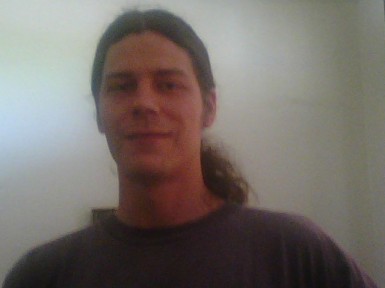Living with Schizophrenia - Dave’s Roundabout Journey to Miami, FL MEET DAVE… Dave, 29, is an excellent chess player. He loves horses, Animal Planet, has a sizable Spanish vocabulary, a fascination with the Argentine pampas, and an extensive knowledge of world geography. He’s a master freestyle rapper, does funny voices, can draw various species of dinosaurs in great detail, and has a very hearty laugh. He also suffers from chronic paranoid schizophrenia. In his world, on many days, strangers on the street are “bullies†wearing disguises and being paid to harass him. He spends much of his day inside, pacing back and forth, too nervous to tackle life outside on his own, and, while creatively gifted, is too confused to run even basic errands without assistance. He has critical thoughts that seem to him to come from outside his head, and believes he has a chip implanted in his neck that controls his moods and body functions. Sometimes he rambles on and on to me in animated conversations about a better future life, because he feels he has to in order to keep his mind focused, and other times, he stares blankly into space, perfectly silent, as if in a trance, saddened by his lost ability to assimilate with others. He’s learned over the last few years that he’s dealt with his illness when to keep quiet about his ideas and when to speak: you won’t hear about the chip until you’ve won his trust. You might even hang out with him for a few days and never realize anything was the matter. He has only a handful of people in his life with whom he can be completely open. In sharp contrast to the image of the crazed psychotic you’ll see in the movies and the news media, Dave is very gentle and meek. He never loses his temper or even raises his voice in anger. When he becomes frustrated, he simply withdraws, complaining of imaginary injustices committed by non-existent people. He fantasizes that one day, he will win a lawsuit against the parties who have done these wrongs to him, and that he’ll buy a sprawling ranch in Cordoba, Argentina with the proceeds. He has to be reminded much of the time to change his clothes or to brush his teeth, yet in many ways he makes a more enjoyable companion than a normal person might: no judgments, hidden agendas, unsavory friends, or materialistic machinations. When returning from the beer store, he’ll dutifully give you the last nickel of your change. He stops to look at lizards and flowers. He’ll regale you with facts about howler monkeys and the reasons why we should keep lynxes as household pets. Dave is one of many people in South Beach who share his illness or others equally or even more debilitating. Many are homeless, addicted to alcohol and drugs, and often dismissed as freeloaders because of their nonstandard choices for self-medication and inability to hold down a steady job. Dave has been lucky. He has found friends who care for him and assist him his housing with his daily living needs. But it wasn’t always that way. I’d like to take this opportunity to share a little of my friend Dave’s story with you, for the benefit of those whose knowledge concerning the subject of mental illness might be lacking, and also to offer information about local resources available for those with who have personal experience with it or affected loved ones in need of support services. I’ll cover the story in two segments. In the first one, you’ll meet Dave, and in the second, you can come along as we find what kind of social services are available in Miami Beach. THE COURSE OF THE ILLNESS A decade ago, when Dave’s symptoms first began to appear, he was living with his parents in a housing project on the outskirts of Philadelphia. His childhood and adolescence had been emotionally troubled, but not to this degree. Dave was inattentive in school and prone to fighting. At 14 he was removed from public school and sent to a special institution for children with emotional disturbances. He was still intellectually capable, however, but by his early 20’s his mental abilities and independent skills began to decline. His parents and his brother, devout fundamentalist Christians, didn’t know what to make of Dave’s illness, choosing instead to blame his strange behavior on the marijuana he used to self-medicate, or possibly demonic possession. Dave began experiencing periods of great anxiety, and his family, unable to deal with his recurring outbursts, called the police on various occasions, who would commit him to a local mental hospital for week-long visits. Dave would refuse to take the medication he was prescribed, and his parents eventually kicked him out of the house. Now homeless, he would take refuge in empty structures at night in order to escape the northern winter cold.  One early November morning in 2002, while sleeping in the hallway of a vacant apartment building, he was startled by a caretaker who woke him up rather abruptly. Dave, believing his safety was in danger, pushed the man away, causing him to fall a few steps down into a nearby stairway. The police were promptly summoned, and Dave was picked up and charged with simple assault, and possession of drug paraphernalia (a homemade pot pipe). This time, however, he wasn’t sent to a psychiatric facility; he was incarcerated for 16 months at George Hill Correctional Facility in Thornton, Pennsylvania, a private prison operated by Wackenhut Security. Despite his well-documented mental health history and a prompt diagnosis by the prison psychiatrists, Dave was housed with the general inmate population, some of whom would beat him from time to time. When he became agitated, he would be placed on suicide watch, or sent to “the hole,†a dark room used for solitary confinement. He was prescribed Trilafan, an antipsychotic drug, but refused to take it. After his eventual release in April 2004, he was placed on the standard probation program, even though there was a separate program for mentally ill offenders. In fact, his probation officer was unaware of his illness until I contacted her a few years later, despite the Axis I (severe mental illness) diagnosis prominently listed in his prison medical records. When he missed a subsequent court date for an open container violation, a bench warrant was issued for his arrest. This, I would later read, is a typical cycle for the mentally ill: once released, they often miss court dates and wind up in jail all over again. As a result, US prisons have become de facto mental institutions. It is estimated that some 16-20% of inmates are mentally ill, expending tax dollars that most experts agree would better be used funding the types of mental health programs these inmates so desperately need. Dave, unaware of his latest warrant, meandered from Pennsylvania via Greyhound bus to a family friend’s house in Daytona Beach, Florida. The friend, Gordon, offered Dave a summer job cleaning buses for his tour business, in exchange for room and board, and a few dollars spending cash. When Gordon took Dave along for a visit to New Orleans in August 2004, Dave was arrested while smoking a joint on a French Quarter door stoop. Gordon, drinking in a nearby bar, was unaware of the incident, and, figuring Dave had wandered off and found a better situation, returned to Daytona without him. Meanwhile, Dave spent the following three weeks in Orleans Parish Prison. Upon his release, he once again became homeless. Some nights he’d sleep under some bushes in the median of Loyola Avenue in front of the New Orleans Hyatt Regency; others, he’d find a sofa to crash on. It never occurred to Dave to attempt to reach Gordon; his illness and immediate life needs were too great a distraction.  I met him the following January; Dave was sitting on a bench in a park just off Frenchmen Street, in New Orleans’ Bohemian Marigny neighborhood, and I was resting from a long walk I’d taken from my house in the lower Garden District. We struck up a conversation, and with a little prodding, I learned he had lost his ID and his Social Security card, and had no place to go. He exuded a very gentle, almost childlike quality that convinced me he wasn’t able to resolve the situation on his own. I surprised myself by offering to let him stay with me until he got a job. He accepted, and we enjoyed a nice lunch at the Praline Connection. It took me about two weeks to realize what was going on with Dave.
I noticed that when we’d visit my friends, he’d withdraw and stare at the floor. Sometimes, late at night, I’d find him pacing back and forth, disturbed by some unknown phantom. I soon realized his job prospects would be very limited. Then, when his prison records I’d ordered finally arrived, I learned that the diagnosis was schizophrenia. Like so many others, I didn’t know what to make of it, wondering if my own life was in jeopardy. I soon learned that it wasn’t. At first, I attempted to reunite him with his family in Pennsylvania. Realizing that to be a mistake, the next month I drove him to Gordon’s house in Daytona. Gordon, likewise, had no interest in taking him. Unwilling to let him return to his former life, I allowed him to stay with me, uncertain as I was about how I would be able to support us both on my modest freelance legal researcher’s income. MISSING KATRINA BY A HAIR I assisted him through the laborious process of applying for Supplemental Security Income (SSI) and Social Security disability. Knowing how often very deserving people are turned away the first time around, we weren’t sure if he would even qualify right away. It turned out, however, that our worries were unfounded: he was approved a scant five months later, on August 1, 2005! We used the settlement to move to Portland, Oregon; I had a friend there who needed my help with a video presentation he was working on. He had offered to rent us out a room, and said we could stay for a while and see how we liked it. Since Portland was at the top of all the best of lists, it seemed a better place for us to live, and for Dave to receive the community services he needed. We set out on our cross country drive on August 9, arriving coincidentally just 10 days before Hurricane Katrina struck New Orleans, blowing out the windows of the Hyatt Regency above Dave’s former hiding spot, and laying much of our former city to waste.  THE ROUNDABOUT JOURNEY TO SOUTH BEACH Once in Portland, Dave consented to regular visits to the local mental heath clinic, and for the first time, agreed to take his medication. His delusions persisted, but took a less prominent place in his mind, and his moods slowly began to even out. Our neighborhood in Portland looked like it had been taken out of a Norman Rockwell portrait, sedate, orderly, with well-kept woodframe homes set back in large, manicured yards, and very green. For the first few months, the Pleasantville-like surroundings were relaxing and novel. Yet, accustomed as we were to the edgy liveliness of our life in New Orleans, Portland seemed to lack a pulse. After four months, we grew weary of the Northwest, and unable to return to New Orleans at the time, we opted for the next best thing: my former city of Los Angeles. In early December 2005, we found a tiny efficiency in a haunted old Hollywood village of storybook apartments called “Normandie Towers,†(aka, “The Village”) originally constructed by Charlie Chaplin for his mistress in 1926, and later used as bungalows for his motion picture studios on La Brea. We remained there for the next few months, while I did work as a movie extra and hunted for temp jobs. But Los Angeles was no longer the laidback, casual place it used to be when I’d first run off there to be an actor in the late 80’s.
Where there used to be car washes and parking lots, mini-malls had sprung up; multi-story condos had replaced much of what little green space had previously existed. It felt like someone had taken all the sprawl and stretched it out a few miles further. The Internet had transformed the landscape of extra work, making it infinitely more complicated, and temp jobs now required a knowledge of many new computer programs that I didn’t know. For his part, Dave wasn’t happy there. He thought it was too big and noisy. Unable to make a good life for ourselves there, we decided to return to New Orleans in March 2006, after I attended a taping of Ellen’s Mardi Gras show in which she encouraged dispersed former residents to return home. We would help the city rebuild! And so, that March we returned to the Big Easy, renting out half of an old, decaying lower Garden District mansion just next door to our former apartment.  There, we attempted to recapture the old sense of routine we’d known before. However, despite our best intentions, we soon realized that the infrastructure there was hopelessly fractured: it would take many years to mend. Crime was running rampant, the justice system was in shambles, hospitals understaffed. Mail delivery was spotty, rents were sky high due to the post-Katrina housing shortage, stoplights would still be blinking nearly two years later, and a feeling of tension was all around us. The suicide rate had risen exponentially, and the local evening news was replete with stories about FEMA woes and spiraling violence. The National Guard was called in to keep the peace. Dave plodded through it all like Mr. Magoo, though I was becoming more apprehensive.  The steamy heat of the summer faded into an equally humid frigid winter, and, with my eye on the ever-lessening quality of life, I remembered how much I’d enjoyed my relaxing visits to South Beach, with its pastel deco cityscape, sensual tropical breezes, and turquoise seas. I recalled past plans to move down, always set aside because practicality dictated that they should be. My intuition told me the time was now ripe, though my rational side provided me with countless reasons not to make the jump. Fortunately, for me, my intuitive side is the strongest! As far as Dave was concerned, his exterior setting was of little importance to him in comparison with what was going on inside his head; for him, our current living situation was just a pit stop for him on his journey to settle in the Argentine farmland. Casting our fortunes to the fickle winds of fate, I drove down to South Beach in early May to scout out apartments. To my surprise, I found a suitable place within two days, and returned to New Orleans to prepare for a June 1 move. We arrived in South Beach at the end of May, beginning a new life based more around the simple enjoyment of the present moment than the practicality or obligation-driven choices of before. As I look back on this tumultuous process, I realize how befriending Dave has changed me. Not only did it save me from a devastating hurricane, I find that the direction of my life is different now. I’m more prone to noticing the lizards, the stray cats, and the foliage. I have less of a desire to define myself by what I do or to find approval from others. I visit gardens and parks a lot more and look at a lot less television. I find that I’m more spontaneous and adventurous.
People often tell me that it’s great what I’m doing for him, perhaps not fully realizing what he’s done for me. People like Dave, though often ostracized in contemporary Western society, were previously revered in Native American culture as shamans, unique visionaries who perceived in their suffering a deeper level of reality, unseen by most “normal” people distracted by the frantic pace of contemporary life. Being a friend and caregiver to a person with a mental disability can be a rewarding experience in ways you never anticipated. I highly recommend it! It’s not all sunshine and roses, though. This little cross-country bonanza has also required me to master the rigors of dealing with various state bureaucracies, making sure that Dave maintains his assistance as we’ve moved from place to place. And now, as new South Beach residents, we’ve once again had to get him set up with his basic services: Medicaid, food stamps, and making sure his Social Security benefits continued on schedule. He also needed to find a mental health clinic with a doctor who could monitor his condition and prescribe medication… In the next segment of this article, I’ll provide a thorough description of the process of acquiring these much needed services—what’s available, what’s not, and what works and what could use improvement—useful information if you or a loved one is living with a mental (or physical) disability and needs state and federal assistance!
You Deserve More Than an Ordinary Vacation.
Travel with Miami Beach 411 Today!
The Miami Beach 411 Travel Store is Open 24/7.
28 Comments on"Living with Schizophrenia - Dave’s Roundabout Journey to Miami, FL"
|

Like what you see? Let's talk about how
we can help your vacation --> Contact Us |
|
Like what you see? Let's talk about
how we can help your vacation
--> Contact Us
how we can help your vacation
--> Contact Us


















CRAINA HURTADO says:
I have always found this very intresting.People refer this as a mental disorder but for me i find these people as very special and uniqe peolpe.Im currently studing for medical asst. and would love to work in this feild.
Posted on 10/26/2007 at 3:46 PM